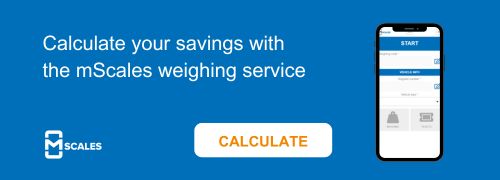Weighing systems have a direct impact on business profitability across various industries — often more than one might realize. It's not just a piece of equipment, but a system that connects to billing, material flows, customer service, and reporting. That’s why weighing should not be seen as a one-time purchase, but as a strategic investment in overall operational efficiency.
Modern, cloud-based weighing systems offer more than just new technology — they transform how data moves, how decisions are made, and how errors are prevented. When the weighing process runs smoothly and accurately, the benefits show clearly on the bottom line.
Not Just a Cost – Why Weighing Systems Should Be Viewed as Part of Your Business Process
A weighing system should not be viewed as a separate technical tool or a necessary expense. It is part of the operational chain that influences how goods move, how invoices are generated, and how information flows within the organization. If this part is slow, inaccurate, or disconnected, the entire process slows down.
The question is not simply “what does a weighing system cost?” But rather “how much does an outdated or inefficient system actually cost us?” Or, from a development perspective: “how much could we save by optimizing the weighing process?”
When weighing is integrated into the entire workflow and data moves automatically in real time, it supports faster decision-making, reduces manual work, and increases productivity.
Hidden Costs of Outdated, On-Premises Weighing Systems
Traditional, locally installed weighing systems may seem cost-effective at first glance, but their hidden costs are often overlooked. These hidden costs typically relate to working hours, maintenance expenses, or delays caused by the system. For example:
- Manual data entry: consumes staff time and increases the risk of errors.
- Error correction: requires work hours and may result in customer complaints.
- Hardware maintenance: depends on local servers and outdated equipment.
- IT support requirements: managing downtime and updates demands resources.
- Downtime: disrupts load handling and slows down operations.
When these inefficiencies add up, they can result in significant costs and operational risks. They also slow down business development and hinder flexible process scaling.

How a Cloud-Based Weighing System Pays Off Over Time
Switching to a modern, cloud-based weighing solution brings benefits that directly affect a company’s cost structure. It’s not just a technological upgrade, but a shift in how operations are managed — reducing steps and improving information flow.
These systems streamline the entire weighing process, automate data collection, reduce errors, and enhance transparency. When the weighing system is directly integrated with ERP systems, customer portals, or logistics platforms, there is no longer a need for separate systems. Each weighing event is reliably recorded and visible in real time in the right places.
This results in faster deliveries, more accurate invoicing, and more efficient use of resources. Less manual work means saved labor hours, fewer errors reduce correction costs, and automated data transfer eases the administrative burden. Additionally, the system stays up to date without separate upgrade projects, reducing IT costs and improving continuity.
/New_07_2023/mScales_Weighing-Cloud-Service_EN.png?width=997&height=773&name=mScales_Weighing-Cloud-Service_EN.png)
From Fixed Assets to Flexible Service – New Model, New Mindset
Traditional systems have typically been purchased as one-time investments. In addition to the software cost, the initial investment often includes various hardware components, their installation, and potential additional expenses if new space is needed to accommodate the equipment.
Cloud-based systems are often offered as a monthly subscription service (SaaS), enabling a new, more flexible model:
- Predictable monthly costs make budgeting easier
- No need for own server infrastructure or heavy installations
- Updates and maintenance are included in the service
- Easy to scale up or down according to business needs
- Lower risk: if the solution doesn't meet expectations, it's easier to cancel the service than to replace a full physical system
This shift reflects a broader change in business thinking: moving from owning infrastructure to adopting flexible services that scale with the company.
Read more: On-Premises vs. Cloud-Based Weighing System
The Real Benefits: Accuracy, Efficiency, and Smarter Operations
Ultimately, the benefits of a modern weighing system are reflected in business outcomes. A good system reduces errors, speeds up operations, improves data quality, and enhances the customer experience. Employees work more smoothly, and the company gains access to more accurate information to support decision-making.
Weighing is often part of a broader process that starts with the arrival of materials or loads, continues through weighing and documentation, and extends to invoicing, inventory management, or reporting. When data flows accurately and in real time between systems, it improves transparency and responsiveness. It makes the business faster, smarter, and more competitive.
Investing in Efficiency Is Investing in Profitability
A modern weighing system is not just an operational tool — it’s an enabler. It removes bottlenecks, supports smarter processes, and brings clarity to operations that directly impact revenue and customer relationships. When the system supports operations holistically, its cost is not merely an expense. It is an investment in efficiency, competitiveness, and long-term profitability.
Want to make sure your weighing system truly supports your business? Book a meeting to see how mScales can help streamline your weighing process: